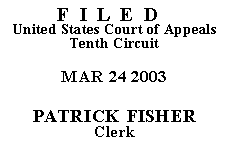

|
GORDON E. STROPE,
v.
DAVID R. McKUNE, Warden,
Lansing Correctional Facility; CARLA
J. STOVALL, Attorney General of
Kansas |
|
Before SEYMOUR, MURPHY, and O'BRIEN, Circuit Judges.
On April 30, 2001, pro se petitioner, Gordon E. Strope, filed a petition for a writ of habeas corpus pursuant to 28 U.S.C. § 2254 in federal district court. The district court denied the petition and Strope now seeks a certificate of appealability ("COA") from this court. See 28 U.S.C. § 2253(c)(1)(A) (providing that no appeal may be taken from a final order disposing of a § 2254 petition unless the petitioner first obtains a COA). Strope is not entitled to a COA unless he can make a "substantial showing of the denial of a constitutional right." Id. § 2253(c)(2). Strope can make this showing by demonstrating that the issues raised are debatable among jurists, a court could resolve the issues differently, or that the questions presented deserve further proceedings. See Slack v. McDaniel, 529 U.S. 473, 483-84 (2000).
Strope raised five claims in his § 2254 petition: (1) he was denied due process when the state trial judge denied his request for a continuance of his trial; (2) he was denied his constitutional right to a jury trial; (3) the sentence he received was calculated based on erroneous information; (4) he was denied a fair trial because the state trial judge was biased against him; and (5) his trial counsel was constitutionally ineffective.
The district court concluded that Strope's claim that he received an erroneous sentence is procedurally barred because it was not presented to the Kansas Court of Appeals. See Coleman v. Thompson, 501 U.S. 722, 735 n.1 (1991). As to Strope's other claims, the district court concluded that the state court's adjudication of those claims did not result "in a decision that was contrary to, or involved an unreasonable application of, clearly established Federal law, as determined by the Supreme Court" or result "in a decision that was based on an unreasonable determination of the facts in light of the evidence presented in the State court proceeding." 28 U.S.C. § 2254(d)(1), (2); Williams v. Taylor, 529 U.S. 362, 405-13 (2000). We have conducted a "preliminary, though not definitive, consideration" of the legal framework applicable to each of Strope's claims. See Miller-El v. Cockrell, 123 S. Ct. 1029, 1040 (2003). From our examination, we conclude that Strope has failed to "demonstrate that reasonable jurists would find the district court's assessment of the constitutional claims debatable or wrong." Slack, 529 U.S. at 484. Accordingly, Strope has not made "a substantial showing of the denial of a constitutional right" and is not entitled to a COA on this issue. 28 U.S.C. § 2253(c). This court denies Strope's request for a COA for substantially those reasons set forth in the district court's order dated August 26, 2002, and dismisses this appeal.
ENTERED FOR THE COURT
Michael R. Murphy
Circuit Judge
*. This order and judgment is not binding precedent, except under the doctrines of law of the case, res judicata and collateral estoppel. The court generally disfavors the citation of orders and judgments; nevertheless, an order and judgment may be cited under the terms and conditions of 10th Cir. R. 36.3.